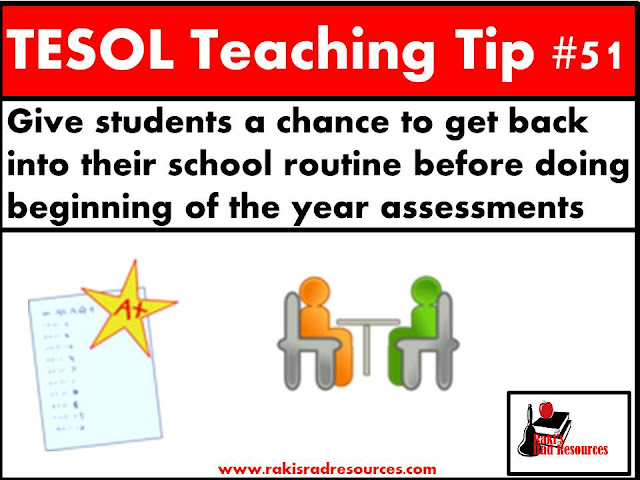As a teacher at an International School, many of my students were English Language Learners. Even my native English speakers were living in a non-English speaking country. Due to my unique teaching position, I have had some readers ask for tips on teaching English Language Learners. Here is this week’s Tuesday TESOL Teaching Tip:
TESOL Teaching Tip #51 - Delay back to school assessments
I don’t understand why he’s so quiet, he spoke English so well last year! I often hear this from teachers of ESL students in their 2nd and 3rd year of English. At the beginning of the year, we have to remember that most of our ESL students come from households and neighborhoods where they do NOT speak or hear English. This means that all that we teach them all school year long rarely gets practiced during the summer. Just like any other skill, speaking English is something that needs to be practiced. ESL students do not LOSE their English over the summer, but they often return to school out of practice, and need a few weeks to return to their previous level of English. For this reason, it is important to try and delay assessments on ESL students until the second or third week of school, when they have had a chance to get back into the swing of the language.
Give students plenty of time to use spoken English and work with partners during those first few weeks of school. Additionally, assigning language based homework (that will be checked, but not graded) like watching and summarizing videos or creating mock dialogues can help students get in the swing of thinking in English outside of the school house.
Last week, we talked about how to help lower level ESL students adjust to an English only environment. How do you help your higher level ESL students make the same adjustment? For more help with higher level ESL students, check out last year’s blog post about Helping Second Year ESL Students.

TESOL Teaching Tip #51 - Delay back to school assessments
I don’t understand why he’s so quiet, he spoke English so well last year! I often hear this from teachers of ESL students in their 2nd and 3rd year of English. At the beginning of the year, we have to remember that most of our ESL students come from households and neighborhoods where they do NOT speak or hear English. This means that all that we teach them all school year long rarely gets practiced during the summer. Just like any other skill, speaking English is something that needs to be practiced. ESL students do not LOSE their English over the summer, but they often return to school out of practice, and need a few weeks to return to their previous level of English. For this reason, it is important to try and delay assessments on ESL students until the second or third week of school, when they have had a chance to get back into the swing of the language.
Give students plenty of time to use spoken English and work with partners during those first few weeks of school. Additionally, assigning language based homework (that will be checked, but not graded) like watching and summarizing videos or creating mock dialogues can help students get in the swing of thinking in English outside of the school house.
Last week, we talked about how to help lower level ESL students adjust to an English only environment. How do you help your higher level ESL students make the same adjustment? For more help with higher level ESL students, check out last year’s blog post about Helping Second Year ESL Students.



No comments:
Post a Comment